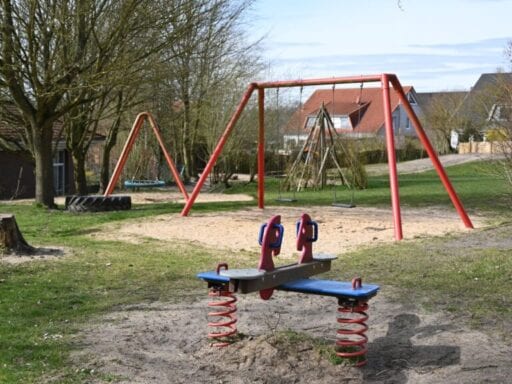The ins and outs of social distancing for children.
In an effort to slow the spread of coronavirus, cities and states are implementing new restrictions, seemingly every hour. The most effective tool is for everyone to stay home, but that’s a tough ask, especially when you’re living with young kids.
“We are fundamentally social animals, and it’s very difficult for us to maintain isolation,” says Dr. John Williams, chief of the division of pediatric infectious diseases at UPMC Children’s Hospital of Pittsburgh, in an email to Vox.
But because kids tend to congregate, sneeze, cough, wipe their noses, hug, wrestle, and “put everything in their mouths,” says Crystal Watson, senior scholar at the Johns Hopkins Center for Health Security, being social comes with added risk.
The new guidelines for everyone of limiting social contact and keeping six feet away make sense as part of a general containment effort, but that calculation gets trickier when kids are involved, especially for parents who have to work. The main question in that case remains, “I have to stay in this house with them for how many days?” followed quickly by “What do I actually do with them?”
Some options get eliminated as cities close down public services. No school. No libraries. No museums. No movies. But not everything can be locked to the public. And a lack of information has parents wondering: what exactly is safe?
Frustratingly, there are no absolutes. Families have to weigh risks versus the demands of work and their children. With that in mind, here’s what some experts recommend.
/cdn.vox-cdn.com/uploads/chorus_asset/file/19817940/1213356908.jpg.jpg) Justin Sullivan/Getty Images
Justin Sullivan/Getty ImagesCan I take my kids outside to play? Yes. Everyone needs to get outside. Kids especially need fresh air and movement, and you don’t have to be restricted to your backyard. But Meghan McGinty, affiliate associate professor at the University of Washington School of Public Health, puts it like this: “Think parks not playgrounds.” The former has open space, easier to maintain the six-foot distance. Bring your own bats, balls, and toys, and clean them after each visit. This helps establish a routine and minimize the spread of germs within the family.
Can they use the playground equipment? It’s a tighter space and a higher risk. Kids move quickly. They touch a lot of surfaces, and it’s impossible to wipe down everything, McGinty says. Watson acknowledges it’s not always practical to keep toddlers away. For her the bigger issue is numbers. If the equipment is crowded with kids, it’s not safe.
Can I have a playdate for my kids? Williams suggests not to in an effort to maintain social distancing. But some families might need to share child care coverage, so again, it’s about limiting the numbers; a general guide is limit playdates to two to three other kids. The essential element is to have a closed social circle – play with the same children all the time. “Then you know the exposures,” Watson says.
Outdoors is preferable, but, if the playdate has to be inside, it’s key to stress maintaining the six-foot distance, not to share food or drinks, to sneeze into your elbow, and, when anyone walks into the house, make sure they wash their hands before doing anything else. You also want to regularly clean high-touch areas, such as doorknobs, switches, remote controls, and handles, McGinty says.
/cdn.vox-cdn.com/uploads/chorus_asset/file/19816916/1212851307.jpg.jpg) Cindy Ord/Getty Images
Cindy Ord/Getty ImagesCan we see the grandparents? No. It’s difficult for young kids to not hug, kiss, and sit on their grandparents, McGinty says, and anyone over 60 years old and with a chronic medical condition is at higher risk. It’s not the time to visit and it’s not the time for them to be babysitting. Instead, the grandparents should stay indoors and minimize all contacts. They, along with people with an underlying medical condition, are the most susceptible and the people who need to be protected during this time.
Can I hire a babysitter? Yes, and it might be necessary for child care since some parents will have to leave the house to work. McGinty says that with colleges being let out, parents have a potential babysitter pool of students coming back early. In a perfect world you’d want someone with CPR certification and first aid knowledge, but at the very least ask if they have any symptoms or have been exposed to anyone with coronavirus symptoms. It wouldn’t hurt to do temperature checks (anyone with a fever above 100.4F, coughing, or shortness of breath should stay home, though remember the virus can spread before people show symptoms.) Bonus points for a sitter who has done 14 days of self isolation.
Watson suggests asking sitters about their attitude toward coronavirus. If it’s at all casual or blasé, keep looking. Whomever you hire, you want to stress maintaining good hygiene.
/cdn.vox-cdn.com/uploads/chorus_asset/file/19816928/1212611278.jpg.jpg) Gary Hershorn/Getty Images
Gary Hershorn/Getty ImagesCan I do a quick errand with my children? While children might not be at increased risk running an errand, the purpose of social distancing is to protect those who are most vulnerable and to limit the severity of the pandemic. McGinty offers a basic question to help determine if you proceed. “Is it really necessary to do?”
Overall, she adds that parents shouldn’t feel pressure to engage in any of the above scenarios, regardless of what friends and neighbors are doing or even what the current recommendation is. It’s fine to be more (but not less) restrictive. If it doesn’t seem right for your family, then that’s your answer. “Parents should do what they feel is necessary to protect their children,” she says.
Steve Calechman has written on desalination systems and pasta water. He was a contributing editor for Men’s Health and his work has appeared in Happify, Harvard Heath, Fatherly, and Greater Good.
Author: Steve Calechman
Read More



